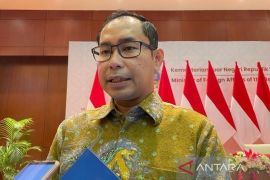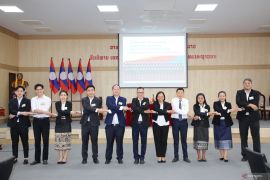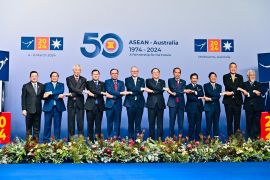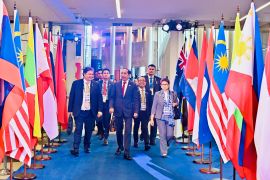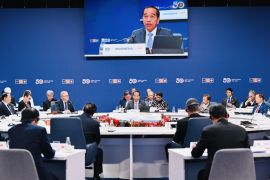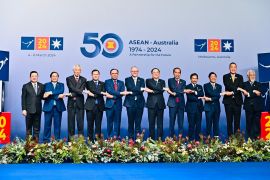In the field of economy it calls for ASEAN`s participation in the global economy and the strengthening of the ASEAN economy. One of the way in strengthening the ASEAN economy is to build potential creative economy in the region.
In this case, Indonesia is encouraging members of the Association of Southeast Asian Nations (ASEAN) to form an ASEAN Creative Economy Community in an effort to create a creative industry market in ASEAN.
"The creative industry in ASEAN is developing extraordinarily so it may well become one of the region`s economic growth engines," Indonesian Tourism and Creative Industry Minister Mari Elka Pangestu said after opening the ASEAN Business and Investment Summit at the Bali International Convention Center.
The minister officially kicked off the ASEAN Business and Investment Summit (ASEAN-BIS) 2011 on Thursday which was being held from November 16 to 18 and attended by around 700 participants representing among others business circles and executives from the ASEAN member countries and dialog partners.
CEOs from multinational companies such as Coca Cola, GE, Caterpillar, Posco, Siam Cement, and Khazanah Nasional are present in the summit.
She said the creative industry in the region was quite attractive but it needed a forum which could unite creative industry businessmen and make them more focused on developing their businesses with wider market targets.
Yet, in order to develop creative industry within ASEAN, the region should develop its human resources.
Developing existing human resources is one way to improve the creative economies in ASEAN, which is one of the Indonesian government`s policies to promote creative economy growth.
"Human resources development is part of the Indonesian government`s policies to improve the creative economy," Mari said.
Therefore, matters relating to development of creative economy have become one of the topics discussed during the investment summit.
"One of the topics of discussion in the ASEAN Summit on Business and Investment this time is development of the creative industry," she said.
The minister said all of the summit`s participants agreed to the proposal made by Indonesia because their respective countries could create added values.
Mari said that of the 10 members of ASEAN, only three, namely Thailand, Singapore and Malaysia, already had an integrated program to develop the creative industry.
Indonesia itself still lacked an integrated program for development of its creative industry, yet it already had a ministry to handle creative industry development.
Head of Policy Google Southeast Asia Ann Lavin shared the minister`s opinion that ASEAN had many potential creative entrepreneurs but they still faced problem in developing their creativities.
ASEAN has many potential creative entrepreneurs but they are often hampered by, among other things, lack of access to capital and markets, and government policies not supportive of innovation, Ann said.
"I have toured ASEAN countries and found many creative entrepreneurs," Ann Lavin said in a parallel session entitled: "Entrepreneurship and Innovation: Engines of Future Growth" held as part of the ASEAN sumit here on Thursday.
She said that one of the things which hampered the development of creative industry in ASEAN countries was the government policy which did not support improvement of the business climate in the development of creative industry.
Ann said that creative businesspeople would not develop well if their surroundings were filled with many restrictions and bans that would not allow them to develop their creative potentials.
The Google executive said that various government polices were actually issued to prevent or to solve a problem but they in practice often turned became barriers. "Regulations should always be issued after thorough and careful considerations," she said.
Therefore, the ASEAN BIS brings together private and public sector organizations, heads of government and captains of industry from within and outside ASEAN for dialogue on various problems and networking, and provides an interactive platform to advance industry and business in the region.
According to Minister Mari Pangestu, the creative economy was a good source of sustainable economic growth because the sector had resources that never run out.
Ideas were one of the very important resources for the development of certain types of creative economic activities, she said citing film as an example.
She said the ASEAN Film Festival being held in Bali on November 16-17 was expected to have a strategic value in that it could stimulate creative industries in the ASEAN countries.
"The ASEAN Film Festival 2011 (AFF 2011) has a strategic value to foster and develop a network of creative industries," Mari said.
Minister Mari She also expressed hope that the AFF 2011 as part of the ASEAN Fair would be able to help to build up pillars for the development of an ASEAN cultural community and ASEAN economic community.
The minister added that the ASEAN Film Festival was staged in an effort to forge stronger unity among ASEAN member countries in the development of creative industries which were now still dominated by the United States, India, Japan, and China.
"ASEAN should not just emphasize the meetings but also the socio-cultural pillars so that we can share the culture and tradition in our respective countries," Mari said.
According to Ukus Kuswara, director general of arts and film at the the tourism and creative economy ministry, the ASEAN Film Festival (AFF) 2011 being held in Bali is part of efforts to develop ASEAN`s human resources in the film sector and establish a cooperation network to promote ASEAN films.
Ukus Kuswara said through the festival the government and the private sector wanted to forge a common commitment to promoting Indonesian and ASEAN films in international arenas.
"This is one of our efforts to develop human resources through those who love films. This matter will be discussed in a forum. Before we sell our films in the international market, we should sell them in ASEAN first to know the regional markets` response," he said. (*)
Editor: Kunto Wibisono
Copyright © ANTARA 2011

